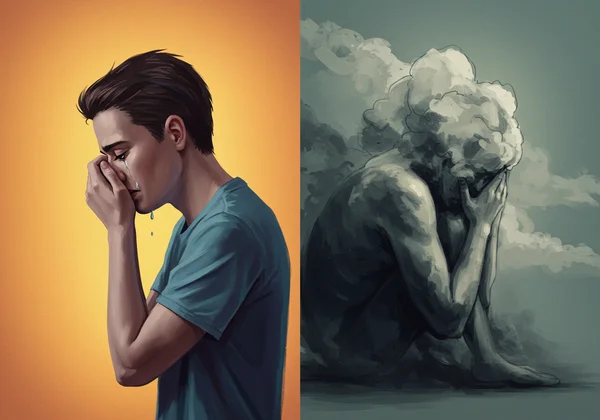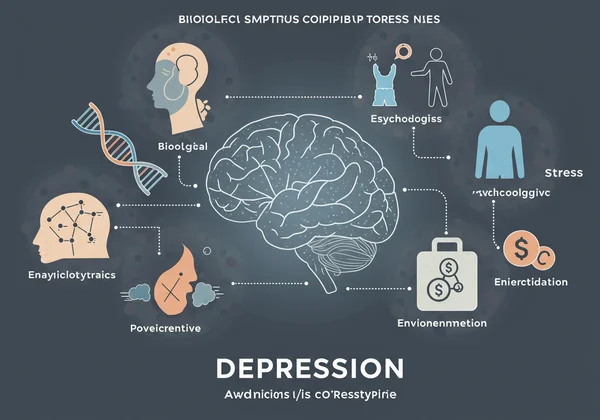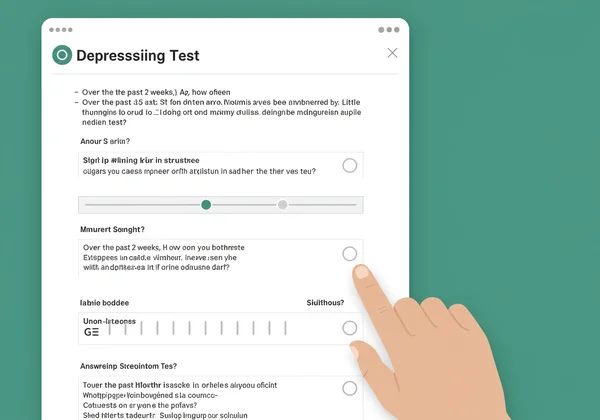Understanding Depression: Guide, Symptoms & Test Insights
September 2, 2025 | By Liam Thornton
Feeling overwhelmed, persistently sad, or just "not yourself"? It’s a feeling many of us experience, but it can be isolating and confusing. You might be asking, Am I depressed or just sad? This comprehensive guide is designed to help you understand what depression is, recognize its various forms and symptoms, and explore how a reliable depression test can offer clarity and a path forward. Gaining insight is the first step toward managing your emotional wellbeing, and a confidential assessment can provide a valuable starting point. You can check your emotional wellbeing with a free tool designed to offer initial insights.
What is Depression? Demystifying the Condition
Depression, clinically known as Major Depressive Disorder, is more than just a passing case of the blues. It is a serious and common medical illness that negatively affects how you feel, the way you think, and how you act. According to the World Health Organization (WHO), it is a leading cause of disability worldwide. Unlike temporary sadness, depression is persistent and can interfere significantly with daily life, making it difficult to function at work, school, or in relationships. Understanding this distinction is crucial for recognizing when it's time to seek support.
Am I Depressed or Just Sad? Key Differences
It’s completely normal to feel sad in response to loss, disappointment, or difficult life events. Sadness is a natural human emotion that typically fades with time. Depression, however, is a mood disorder characterized by a persistent feeling of sadness or a loss of interest that lasts for at least two weeks.
Key differences include duration, intensity, and impact. While sadness is often tied to a specific trigger, depression can feel like a heavy cloud with no clear source. It affects your self-esteem, energy levels, and overall perspective on life in a way that temporary sadness does not. If these feelings are prolonged and disruptive, an online depression test can help clarify what you're experiencing.

Common Causes & Risk Factors for Depression
Depression doesn't have a single cause; it's usually a combination of factors. Understanding these can help demystify the condition and reduce self-blame.
-
Biological Factors: Genetics can play a role. If you have a family history of depression, you may be more susceptible. Brain chemistry is also key, as imbalances in neurotransmitters like serotonin and dopamine are linked to depressive symptoms.
-
Psychological Factors: Individuals with low self-esteem, who are easily overwhelmed by stress, or who are generally pessimistic appear to be more vulnerable. Past trauma or abuse can also be a significant trigger.
-
Environmental Factors: Continuous exposure to stress, neglect, violence, or poverty can make some people more vulnerable to depression. Major life events such as the loss of a loved one, financial problems, or significant relationship changes can also precipitate an episode.

Exploring Types of Depression: Beyond the Blues
Depression is not a one-size-fits-all condition. It manifests in various forms, each with its unique set of symptoms and challenges. Recognizing the specific type can help in finding the most effective path toward management and recovery.
Major Depressive Disorder (MDD) Explained
Major Depressive Disorder is what most people think of when they hear the term "depression." It is characterized by a combination of symptoms that interfere with the ability to work, sleep, study, eat, and enjoy life. An episode can occur once in a person's lifetime, but more often, a person has several episodes. Symptoms must last for at least two weeks to be diagnosed as MDD.
Understanding Persistent Depressive Disorder (Dysthymia)
Persistent Depressive Disorder, also known as dysthymia, is a form of chronic depression that lasts for at least two years. While the symptoms may be less severe than those of Major Depressive Disorder, they are long-lasting and can significantly impact your quality of life. People with dysthymia may be seen as simply "gloomy" or pessimistic, but they are dealing with a real and manageable condition.
Smiling Depression: Recognizing Hidden Symptoms
"Smiling depression" is not a clinical diagnosis but is a term used for people who live with depression while appearing happy or content on the outside. They often maintain jobs, families, and social lives, all while masking their internal struggle. This can be one of the most dangerous forms, as those suffering may be hesitant to seek help, and their loved ones may not recognize the warning signs.
Distinguishing Bipolar Depression from Major Depression
While both involve periods of low mood, bipolar depression is part of a larger condition, bipolar disorder, which also includes episodes of mania or hypomania (elevated mood). A standard depression screening test may not distinguish between the two, which is why it's vital to consult a healthcare professional for a full diagnosis. Getting the right diagnosis is critical, as the treatments for unipolar depression and bipolar depression are very different.
Recognizing the Signs: A Comprehensive Depression Symptoms Guide
Identifying the symptoms of depression is the first step toward getting help. They can range from subtle to severe and impact emotional, physical, and behavioral health.
Emotional & Psychological Warning Signs of Depression
The most well-known symptoms are emotional, but they go far beyond simple sadness. Look out for:
-
Persistent feelings of sadness, anxiety, or "emptiness."
-
Feelings of hopelessness or pessimism.
-
Irritability, frustration, or restlessness.
-
Loss of interest or pleasure in hobbies and activities (anhedonia).
-
Feelings of worthlessness, guilt, or helplessness.
-
Difficulty concentrating, remembering, or making decisions.

Physical & Behavioral Symptoms to Watch For
Depression is not just in your head; it manifests physically and behaviorally. These signs are often overlooked:
- Changes in sleep patterns (insomnia or oversleeping).
- Significant weight loss or gain due to changes in appetite.
- Fatigue or decreased energy.
- Unexplained physical problems, such as headaches or digestive issues.
- Social withdrawal and isolation.
- Increased use of alcohol or drugs.
Teenage Depression Symptoms: A Parent's Perspective
In teens, depression can look different. Symptoms might include irritability, anger, and poor performance in school rather than overt sadness. They might complain of aches and pains, withdraw from friends and family, and become extremely sensitive to criticism. Recognizing these signs and encouraging your child to take a depression test for teens can be a supportive first step.
How a Depression Screening Test Can Help You
If you recognize any of these symptoms in yourself or a loved one, you may be wondering what to do next. An online depression test is an excellent, confidential first step to gain clarity. It’s a tool designed to empower you with information.
What is a Depression Screening Test and How Does It Work?
A depression screening test is a questionnaire designed to assess for the presence and severity of depressive symptoms. Our free online depression test is based on scientifically validated screening principles, like the PHQ-9, to ensure reliability. You answer a series of questions about your feelings and behaviors over the past two weeks. The process is quick, confidential, and provides immediate, preliminary results.

Interpreting Your Depression Test Score: What It Means
After completing the questionnaire, you'll receive a score that typically falls into a range, such as minimal, mild, moderate, or severe depression. This score is not a diagnosis. Instead, it’s a snapshot of your current emotional state that can help you understand if your symptoms warrant further attention. It’s a tool for self-awareness, providing a concrete starting point for a conversation with a doctor or mental health professional. You can discover your results instantly after taking the test.
Taking the First Step: Your Free Online Depression Test
Knowledge is power. Taking a free online depression test is a proactive, private, and pressure-free way to check in with yourself. On our platform, you can get an initial summary for free, with the option to unlock a more detailed, AI-powered report that offers personalized insights and actionable steps. It’s a resource designed to guide you from confusion to clarity.
Taking Charge of Your Mental Health: Next Steps
Understanding depression is the first step, but taking action is what truly matters. Recognizing the signs in yourself or others and utilizing tools like a depression screening test can illuminate the path forward. Your emotional wellbeing is a priority, and there are resources available to support you on your journey.
Remember, seeking help is a sign of strength, not weakness. We encourage you to start your free test today to gain valuable insights into your mental health. Share this guide with anyone who might find it helpful, and let's work together to break the stigma surrounding depression.
Your Questions Answered
How do I check if I am depressed?
A great first step is to reflect on your symptoms and their duration. If you've been feeling persistently low for over two weeks, a self-assessment tool can be very helpful. The free and confidential online depression test on our site is designed to provide you with initial insights based on your recent feelings and behaviors.
What are the warning signs of depression?
Key warning signs include a persistent sad or empty mood, loss of interest in activities you once enjoyed, significant changes in sleep or appetite, fatigue, feelings of worthlessness, and difficulty concentrating. Physical symptoms like unexplained aches and pains can also be a sign.
What does my depression test score mean?
Your score provides a preliminary indication of the severity of your symptoms, often categorized as mild, moderate, or severe. It is not a clinical diagnosis but a valuable tool for self-awareness. It can help you decide if it's time to speak with a healthcare professional about how you're feeling.
Is a depression screening test a diagnosis?
No, a screening test is not a substitute for a professional diagnosis. It is an informational tool designed to help you identify potential symptoms and understand their severity. A formal diagnosis can only be made by a qualified healthcare provider, such as a doctor or psychologist.
Can a blood test detect depression?
Currently, there is no blood test that can diagnose depression. Diagnosis is based on a comprehensive psychological evaluation conducted by a healthcare professional. While research is ongoing, a clinical interview remains the standard for diagnosis.